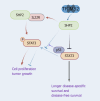Targeting SHP2: Dual breakthroughs in colorectal cancer therapy-from signaling pathway modulation to immune microenvironment remodeling
- PMID: 40697246
- PMCID: PMC12278243
- DOI: 10.4251/wjgo.v17.i7.107380
Targeting SHP2: Dual breakthroughs in colorectal cancer therapy-from signaling pathway modulation to immune microenvironment remodeling
Abstract
SHP2 is the first identified oncogenic tyrosine phosphatase that promotes colorectal cancer (CRC) progression, and it is consistently overexpressed in CRC. It facilitates CRC oncogenesis by mediating downstream signaling cascades of receptor tyrosine kinases, including the RAS/ERK, JAK/STAT, and PI3K/AKT pathways, which are clinically associated with poor prognosis. Furthermore, SHP2 orchestrates immunosuppressive signaling networks by impairing cytotoxic T cell infiltration and changing the phenotype of tumor-associated macrophages within the tumor microenvironment (TME). Targeting SHP2 represents a dual therapeutic strategy in CRC: It concurrently regulates RTK signaling and reprograms the immunosuppressive TME. SHP2 inhibitors, administered both as monotherapy and in combination regimens, have advanced into clinical trial phases. Consequently, SHP2 serves as both a molecular target for precision oncology and an immunomodulatory node, positioning it as a high-priority candidate for CRC treatment.
Keywords: Colorectal cancer; PI3K/AKT pathway; Protein tyrosine phosphatase SHP2; Targeted therapy; Tumor microenvironment.
©The Author(s) 2025. Published by Baishideng Publishing Group Inc. All rights reserved.
Conflict of interest statement
Conflict-of-interest statement: The authors declare that they have no conflicts of interest pertaining to the subject matter discussed in this paper.
Figures




References
-
- Siegel RL, Giaquinto AN, Jemal A. Cancer statistics, 2024. CA Cancer J Clin. 2024;74:12–49. - PubMed
-
- Bray F, Laversanne M, Sung H, Ferlay J, Siegel RL, Soerjomataram I, Jemal A. Global cancer statistics 2022: GLOBOCAN estimates of incidence and mortality worldwide for 36 cancers in 185 countries. CA Cancer J Clin. 2024;74:229–263. - PubMed
Publication types
LinkOut - more resources
Full Text Sources
Miscellaneous

